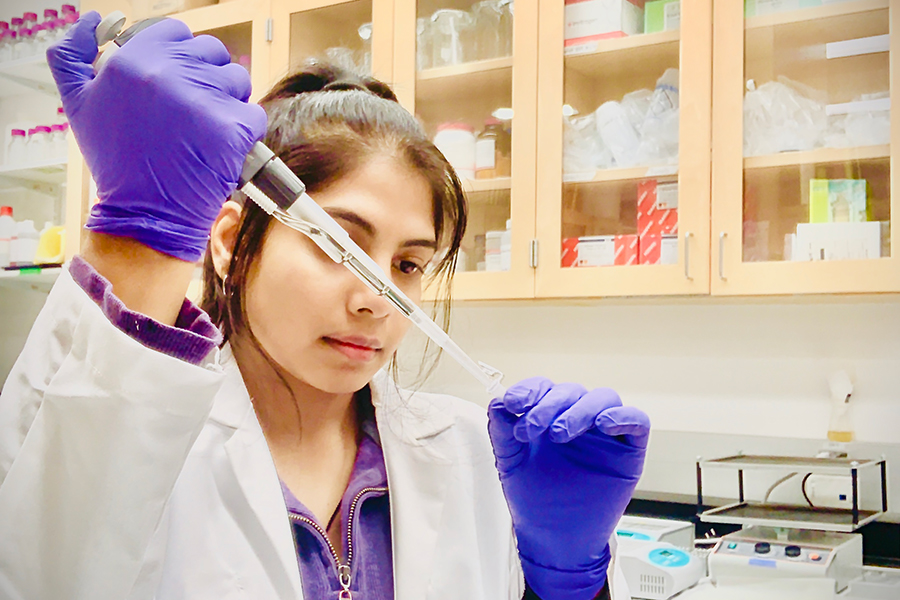Student Spotlight: Aliza DeNobrega

Aliza DeNobrega is a doctoral student in the Florida State University Program in Neuroscience and Department of Biological Science, both part of the College of Arts and Sciences.
Where are you from, and what year are you in school? What is your anticipated graduation date for your doctoral degree?
I was born and raised in Guyana, South America. I am a sixth-year doctoral student with plans to graduate in Summer 2020.
What brought you to Florida State University?
At many other universities, neuroscience programs are organized independent of the other sciences. At FSU, many research interests and programs interconnect. The neuroscience program is interdisciplinary, meaning research professors hail from many departments including biology, psychology and medicine. Communicating with professors studying the brain from diverse perspectives allows me to extend my techniques and use of resources available. Secondly, the faculty are extraordinarily collegial. They collaborate to pursue funding and ask and answer scientific questions. Finally, many professors in my program and department are good mentors. It’s my goal to be a mentor one day, so I appreciate these positive examples in my roles as a lecturer and a scientist.
What inspired you to choose your major and specific areas of research? What aspect of neuroscience do you find most fascinating?
I love the challenging puzzle that is the neuroscience of sleep and aging. Having conducted research across many animal models including humans, I’m intrigued by the similarities among diverse species of animals. We deem ourselves special as humans because of our brains when, in reality, underlying molecular mechanisms that control our motivated behavior are not significantly different than those of a fly or mouse.
For example, like humans, flies get drunk when they consume alcohol. They develop preferences for alcohol so strong that they will overcome electric shocks to acquire alcohol. The neural circuitry and molecular machinery that control daily rhythms in humans and mice are also very similar. These similarities between our neurobiology and that of other organisms are humbling and fascinating.
How did you get involved in the King Life Sciences lab?
When interviewing for graduate school, I was advised to choose a lab where I can bring something to the table while learning something new. I decided to learn more about the molecular and cellular mechanisms that underlie behavioral outputs. At Lisa Lyons’ lab, I study behaviors and the molecular programs that govern behaviors.
What is your research? How do biology and psychology work together in your research?
My research broadly investigates sleep and circadian rhythms in aging. More specifically, I test how aging alters sleep and circadian behavior and how these changes affect alcohol responses. These behavioral changes are often the result of biological changes occurring at the anatomical level in the circuitry and/or at the molecular level through reprogramming of gene and protein expression. I use changes I observe at the behavioral level to dissect changes occurring at the cellular and molecular level. Therefore, it’s important to design my behavioral tests to mirror human behavior as much as possible if I want to uncover genes and proteins that can be investigated further as therapeutic targets for drugs to treat aging-related disorders in humans.
Are there any faculty/staff that have helped or inspired you?
Along with my adviser, professor of biological science Lisa Lyons, many faculty have contributed significantly to my academic success, including professor of neuroscience and psychology chair Frank Johnson, associate professor of biomedical science and neuroscience Michelle Arbeitman, professor of neuroscience and biological science chair Tom Houpt, and biological science professor James Fadool. I tell colleagues I’m an adopted student in these professors’ labs because they treat me like their own students. Debra Fadool, head of the Debi Fadool Laboratory in the Program in Neuroscience, is the faculty member I admire most. Her motivation to use her expertise to help the program evolve is truly inspiring. Finally, I wouldn’t get far without the administrative staff in my department, including Bobbie Weston and Virginia Carter. I am grateful for their help with the technicalities of graduate school.
What on-campus resources/departments or offices have helped prepare you for academic success?
The Fellows Society has been instrumental in providing me with helpful tools and information. Lisa Liseno, assistant dean of the Graduate School, is extremely supportive and always around when you need direction academically or professionally or if you just need to talk. The Congress of Graduate Students, FSU Foundation and the Graduate School have assisted me financially, making it possible to attend conferences and conduct research.
What do you like to do when you’re not working on schoolwork or research?
With the little free time I have, I enjoy cooking and spending time with my family. I also like going on long runs and building miniature models of famous buildings and furniture.
Upon receiving your doctorate, what are your plans?
My 10-year plan includes securing a non-academic job, preferably in technology transfer or medical/scientific consulting with the goal of eventually founding a biotechnology company.
Although you might miss FSU, what are you looking forward to in your post-graduate life?
I’m looking forward to catching up on sleep, time with my relatives and friends, and all the community service activities that I’ve given up due to the demands of grad school. Most of all, I’m looking forward to marrying my fiancé and starting a family.
What advice do you have fellow students?
Find what you love and pursue it relentlessly. Keep in mind that loving your craft doesn’t make it easy. Master time management and emotional energy management — remember to make time for rest and recovery. Recognize and welcome constructive criticism. Don’t be afraid to ask for help and never be too arrogant to learn from someone junior to you. Get to know everyone in your immediate environment; you never know when you’ll need someone’s help. Respect and thank the custodians and administrative staff. Finally, establish boundaries between your work/academic life and your personal life and strive for balance.
